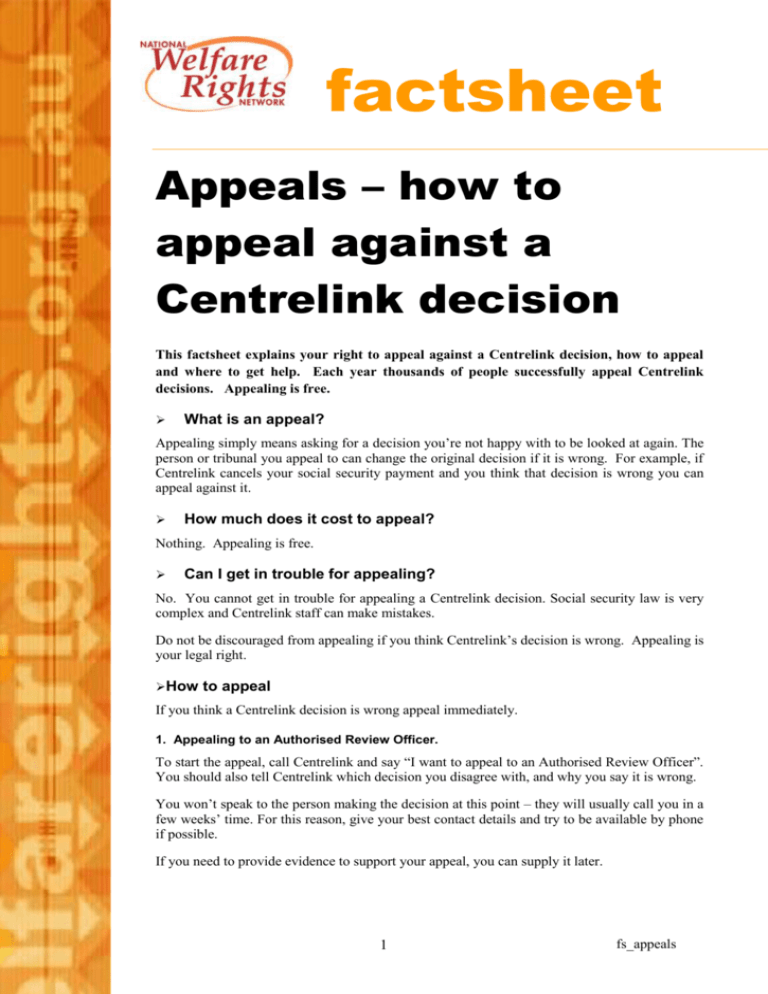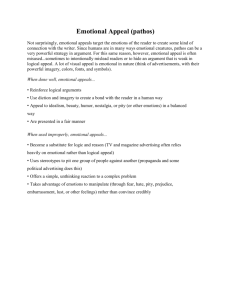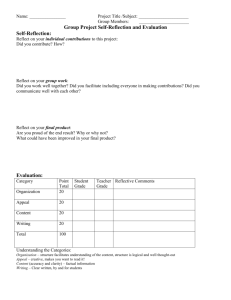Appeals – how to appeal against a Centrelink decision
advertisement

factsheet Appeals – how to appeal against a Centrelink decision This factsheet explains your right to appeal against a Centrelink decision, how to appeal and where to get help. Each year thousands of people successfully appeal Centrelink decisions. Appealing is free. What is an appeal? Appealing simply means asking for a decision you’re not happy with to be looked at again. The person or tribunal you appeal to can change the original decision if it is wrong. For example, if Centrelink cancels your social security payment and you think that decision is wrong you can appeal against it. How much does it cost to appeal? Nothing. Appealing is free. Can I get in trouble for appealing? No. You cannot get in trouble for appealing a Centrelink decision. Social security law is very complex and Centrelink staff can make mistakes. Do not be discouraged from appealing if you think Centrelink’s decision is wrong. Appealing is your legal right. How to appeal If you think a Centrelink decision is wrong appeal immediately. 1. Appealing to an Authorised Review Officer. To start the appeal, call Centrelink and say “I want to appeal to an Authorised Review Officer”. You should also tell Centrelink which decision you disagree with, and why you say it is wrong. You won’t speak to the person making the decision at this point – they will usually call you in a few weeks’ time. For this reason, give your best contact details and try to be available by phone if possible. If you need to provide evidence to support your appeal, you can supply it later. 1 fs_appeals Authorised Review Officers (or “ARO”s) are senior Centrelink officers who have the power to change Centrelink decisions. You can appeal to an ARO at any time. However you must appeal within 13 weeks of the original decision if you want back pay to the date of the original decision. If you appeal after 13 weeks and you are successful, you will only receive back pay from the date you put in your appeal. 2. What if I’m not happy with the ARO decision? If you’re not happy with the ARO decision, you have the right to appeal to the Social Security Appeals Tribunal (SSAT). The SSAT is independent from Centrelink. The SSAT can only hear cases that have been reviewed by an ARO. The SSAT is fairly informal and you should have every opportunity to discuss your case at the hearing. Appealing to the SSAT is free. You can appeal at any time. However you must appeal within 13 weeks of the AROs decision if you want back pay to the date of the original decision. If you appeal after 13 weeks and you are successful, you will only receive back pay from the date you put in your appeal with the SSAT. 3. What if I think the SSAT decision is wrong? If you think the SSAT decision is wrong you have the right to appeal to the Administrative Appeals Tribunal (AAT). Centrelink can also appeal against the SSAT decision to the AAT. You should get advice from your local Welfare Rights Centre/Advocate or Legal Aid office regarding this stage of appeal. Appealing to the AAT is free. You must lodge your appeal to the AAT in writing within 28 days of getting the SSAT’s decision. In limited circumstances the AAT may give you an extension of time to put in your appeal. 4. What if I think the AAT decision is wrong? You can appeal against a decision of the AAT to the Federal Court but only on a “question of law”. You should not appeal to the Federal Court without seeking legal advice about the chance of success and the possible cost of the appeal. Appeals can be very expensive. You must appeal to the Federal Court within 28 days of getting the AAT’s decision. In limited circumstances the Federal Court may give you an extension of time to put in your appeal. Can I get paid while I appeal? If you appeal against the cancellation or reduction of your payment, Centrelink may agree to continue your payment at the previous rate until the review is finalised. This is called “payment pending review”. When deciding whether your payment should be continued pending review, Centrelink may consider whether you are in “severe financial hardship”. There is a risk that if your appeal is unsuccessful Centrelink will try to recover any payments that you receive pending review. If you are appealing an eight week no payment period Centrelink must automatically continue your payment pending review. Time limits? You can appeal to an ARO or from an ARO to the SSAT at any time. However you should appeal within 2 fs_appeals 13 weeks of the decision you disagree with so that you can be back paid to the date of the original decision. If you appeal after 13 weeks and you are successful, you will only receive back pay from the date you put in your appeal. There is no time limit to appeal a debt to an ARO or to the SSAT. From the SSAT the appeal to the AAT (including appeals about debts) must be lodged in writing within 28 days. Different time limits apply to family assistance and parental leave payments. The chain of appeal and time limits ODM Original Decision Maker (within Centrelink) A person should appeal an original decision to an Authorised Review Officer (ARO) within 13 weeks of receiving the original decision. ARO Authorised Review Officer (within Centrelink) A person should appeal an ARO's decision to the SSAT within 13 weeks of receiving the ARO decision in writing. SSAT The Social Security Appeals Tribunal A person must appeal an SSAT decision to the AAT within 28 days of receiving the SSAT's decision. AAT The Administrative Appeals Tribunal A person must appeal an AAT decision to the Federal Court within 28 days of receiving the AAT's decision. What if I disagree with a decision about a family assistance payment? Different rules generally apply for appeals to the ARO and the SSAT about family assistance payments, such as Family Tax Benefit, Child Care Benefit, Baby Bonus and Maternity Immunisation Allowance. If you are appealing to an ARO about a family assistance payment decision, you should generally do so within 12 months of the decision, or by 30 June for the following income year. This will ensure that your appeal can be accepted and that you can be paid maximum back pay. For example: if you disagree with a decision about the 2011/12 year, you must appeal by 30 June 2013, or by 12 months from the decision, whichever is later. Claims for a past period must be lodged within two years of the relevant financial year (eg a claim or appeal about the 2011/12 year must be sought by 30 June 2014. An appeal to the SSAT about a family assistance payment decision must generally be lodged within 13 weeks of the date you were notified of the ARO's decision. The Tribunal may accept an appeal outside the 13 week time limit if it accepts that there are "special circumstances" to do so. If you are appealing to an ARO or to the SSAT about a family assistance payment debt only, no time limits apply. This means that if your appeal is successful, and your debt is cancelled or recovery waived, you may be entitled to a refund of the amount you have paid back to Centrelink. Where can I get help with my appeal? If you have any questions about making an appeal, you should contact your local Welfare Rights Centre/Advocate. 3 fs_appeals Welfare Rights Centres are community legal centres which provide free legal advice and assistance with Centrelink problems. They specialise in Social Security law. They are independent of Centrelink. Contact the Welfare Rights Centre / Advocate in your state/region see: www.welfarerights.org.au. You can also get advice from your local community legal centre or Legal Aid office. Interpreters If you think you need an interpreter, or if you feel more confident with an interpreter, you should use one of the three free available interpreter services. Most Centrelink offices have interpreters available at regular times each week. Your local Centrelink office can tell you about their available languages and times. You can telephone the Centrelink Multilingual Call Centre on 131 202 and speak to a bilingual Centrelink officer. You can also call the free Telephone Interpreter Service (TIS) on 131 450 and ask for an interpreter. Please note: This factsheet contains general information only. It does not constitute legal advice. If you need legal advice please contact your local Welfare Rights Centre/Advocate. Welfare Rights Centres are community legal centres, which specialise in social security law, administration and policy. They are independent of Centrelink. All assistance is free. This factsheet was updated in July 2012. www.welfarerights.org.au 4 fs_appeals








